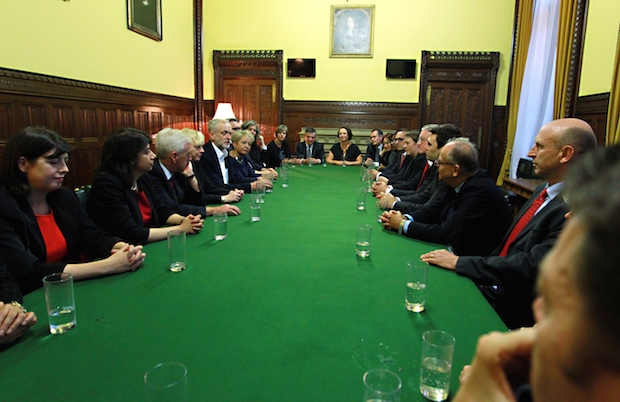Jeremy Corbyn surfaced last night to do his first round of broadcast interviews since becoming Labour leader. The two key lines were on Europe and Trident, and though the interviewers were interested in these issues, Corbyn also had an interest in being as clear as he possibly could be on them as they play a large part in holding his Shadow Cabinet together.
Labour MPs spent a lot of time chatting with one another and debating whether it was the right thing to join the Corbyn frontbench as he assembled it on Sunday night. They reached different conclusions, with some fearing they would be tainted by a hopeless administration that they didn’t agree with, others refusing to play any part in an administration they fear will inflict lasting damage on their party, but others still deciding that the best way of serving their party in a crisis would be to become a shadow minister.
This means that no frontbencher is feeling particularly thrilled to have been promoted. One I congratulated earlier this week said ‘oh, whatever’, while another said grimly that ‘I’m not sure congratulations is quite the right word’. A third says ‘we do want to give him a chance, but we’re not there to build him up’. There’s a big difference: they’re there for Project Labour, not Project Jeremy. To that end, many of them expect to be the voice on their particularly policy area – hence Owen Smith making rather different noises to his leader on the benefit cap.
What would break their tenuous ties with Project Jeremy (which is really Project Left, to be fair to Corbyn, who is the very definition of ‘some have greatness thrust upon them’) would be him breaking individual assurances on Trident and the EU. There seems to be some discrepancy between what the leader has said to different shadow ministers on the EU, with Chuka Umunna deciding he couldn’t serve because Corbyn wasn’t fully committed to staying in Europe and Hilary Benn saying Labour was committed to staying in. But last night Corbyn said:
‘No, I don’t see that position [Labour campaigning to leave] because I think we are going to be working with trade unions and social groups all across Europe as well as social groups in this country.
‘I see the way forward as how we develop the idea of a social Europe. What I was opposed to and remain opposed to is the idea that David Cameron could go around Europe and give up workers’ rights, give up environmental protection, give up a whole lot of things that are very important.’
The leader has also assured ministers of a free vote on Trident and his Shadow Cabinet would disintegrate if he didn’t keep this promise. So last night he said:
‘I hope the party will come to a position of wanting us to become a nation that does not renew nuclear weapons, but we are not going to divide and ruin ourselves as a party over this.’
But even if Corbyn does stick to his word on these matters, chances are that all his frontbenchers won’t want to stick with him if he does manage to bed in for the long term. They have to respect the mandate he has been given – one he rightly refers to repeatedly – but they will at some point start to panic about the 2020 election, and find other policies that they really can’t stomach.
Currently it seems to be acceptable for frontbenchers to differ on policy issues, and in one sense that is no bad things as it makes politicians look more honest, but at some point the party will have to coalesce around a set of policies that it can talk clearly about to voters, rather than everyone offering their own manifesto. And if Corbyn manages to get to a stage where he can and should be switching from open discussion to a unified message, he’ll find a number of shadow ministers aren’t prepared to switch with him.







Comments